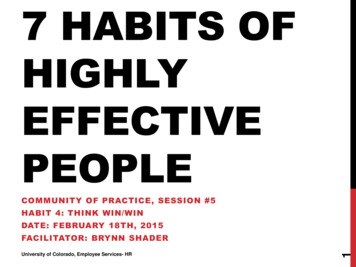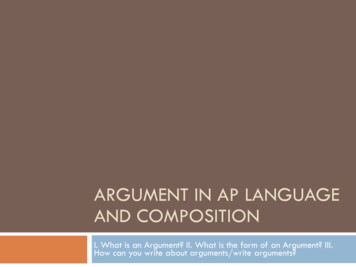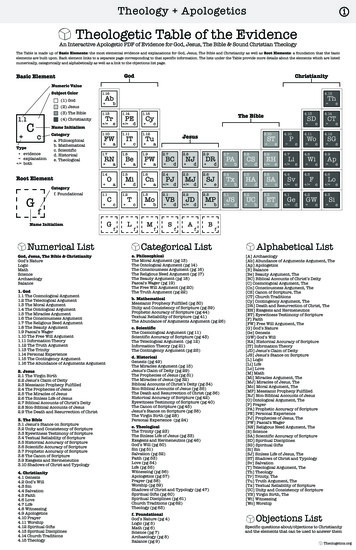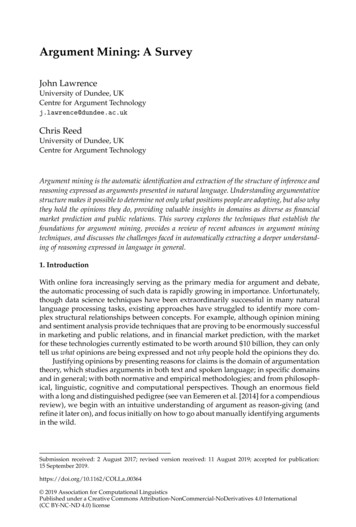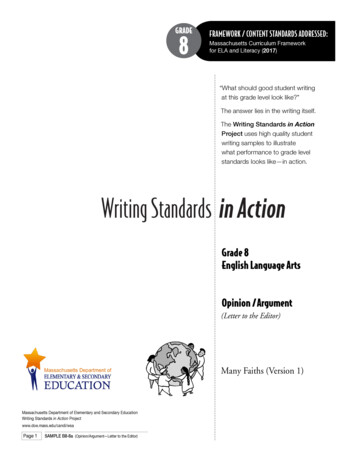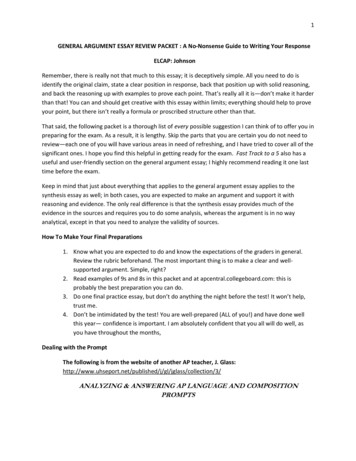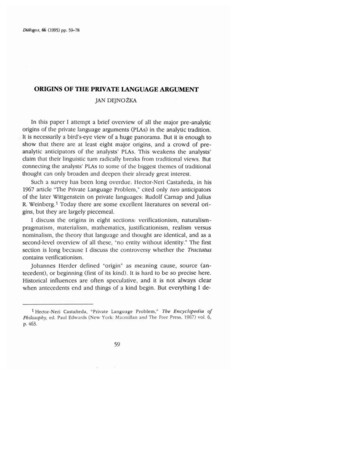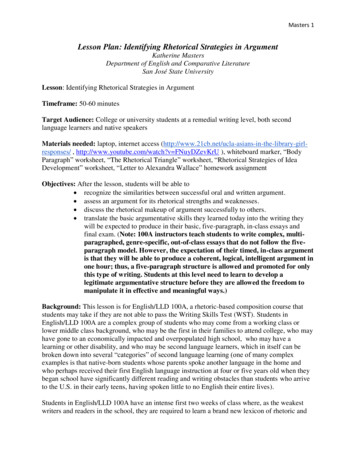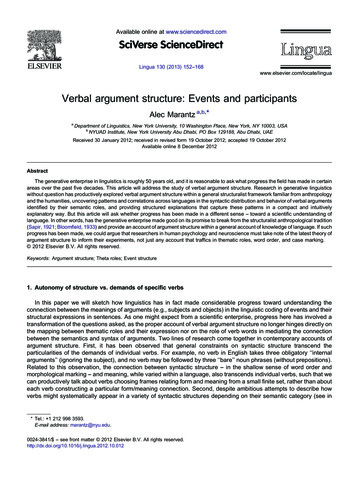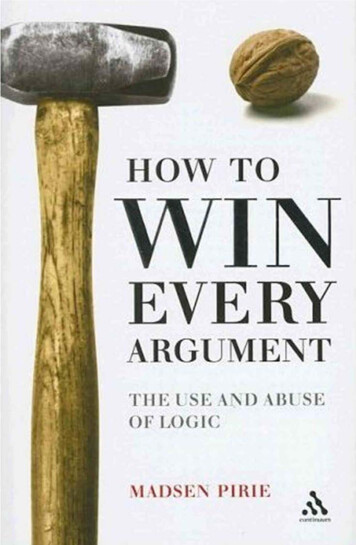
Transcription
How to Win EveryArgumentThe Use and Abuse of Logic
Also available from ContinuumWhat Philosophers Think - Julian Baggini and Jeremy StangroomWhat Philosophy Is - David Carel and David GamezGreat Thinkers A-Z - Julian Baggini and Jeremy Stangroom
How to Win EveryArgumentThe Use and Abuse of LogicMadsen Pirie \ continuum L O N D O N NEWYORK
To Thomas, Samuel and RosalindContinuum International Publishing GroupThe Tower Building11 York RoadLondonSE1 7NX15 East 26th StreetNew York, NY 10010 Madsen Pirie 2006All rights reserved. No part of this publication may be reproduced or transmitted in anyform or by any means, electronic or mechanical, including photocopying, recording, orany information storage or retrieval system, without prior permission in writing from thepublishers.Madsen Pirie has asserted his right under the Copyright, Designs and Patents Act, 1988,to be identified as Author of this workBritish Library Cataloguing-in-Publication DataA catalogue record for this book is available from the British Library.ISBN: 0826490069 (hardback)Library of Congress Cataloguing-in-Publication DataA catalog record for this book is available from the Library of Congress.Typeset by YHT Ltd, LondonPrinted and bound in Great Britain by MPG Books Ltd, Bodmin, Cornwall
ContentsAcknowledgmentsIntroductionviiiixAbusive analogy1Accent35AccidentAffirming the consequentAmphiboly79Analogical fallcyAntiquitam, argumentum ad1114ApriorismBaculum, argumentum ad1517Bifurcation19Blinding with scienceThe bogus dilemma2224Circulus in probandoThe complex question (plurium interrogationum)2729Composition31Concealed quantificationConclusion which denies premises33Contradictory premises3839Crumenam, argumentum adCum hoc ergo propter hocDamning the alternatives354144
How to Win Every ArgumentVIDefinitional retreatDenying the antecedentDicto simpliciter4649DivisionEmotional appeals535551Equivocation58Every schoolboy knows60The exception that proves the rule63Exclusive premisesThe existential fallacy6567Ex-post-facto statistics69Extensional pruning72False conversionFalse precision74The gambler's fallacy7679The genetic fallacy82Half-concealed qualificationHedging83Hominem (abusive), argumentum ad88Hominem (circumstantial), argumentum adIgnorantiam, argumentum ad9092Ignorantio elenchi94Illicit processIrrelevant humour9799Lapidem, argumentum adLazarum, argumentum adLoaded words86101104106Misericordiam, argumentum ad109Nauseam, argumentum adNon-anticipation111114Novitam, argumentum ad116Numeram, argumentum ad118One-sided assessmentPetitio principii121123
ContentsPoisoning the wellvu126Populum, argumentum ad128Positive conclusion from negative premisePost hoc ergo propter hoc130131Quaternio terminorumThe red herring133Refuting the exampleReification138The runaway trainSecundum quid142136140Shifting ground145147Shifting the burden of proof149The slippery slopeSpecial pleading151153The straw manTemperantiam, argumentum ad155157Thatcher's blameTrivial objections160162Tu quoqueUnaccepted enthymemes166The undistributed middle168Unobtainable perfection171Verecundiam, argumentum ad173Wishful thinking176Classification of fallacies164179
AcknowledgmentsMy thanks for their helpful suggestions go to Eamonn Butler andJohn O'Sullivan. For assistance with the preparation, I thank TomLees, Steve Masty, Sam Nguyen and Xander Stephenson. I alsothank all those who have aided and encouraged this work, notleast the publisher and editor.
IntroductionSound reasoning is the basis of winning at argument. Logicalfallacies undermine arguments. They are a source of enduringfascination, and have been studied for at least two-and-a-halfmillennia. Knowledge of them is useful, both to avoid those usedinadvertently by others and even to use a few with intent todeceive. The fascination and the usefulness which they impart,however, should not be allowed to conceal the pleasure whichidentifying them can give.I take a very broad view of fallacies. Any trick of logic or language which allows a statement or a claim to be passed off assomething it is not has an admission card to the enclosurereserved for fallacies. Very often it is the case that what appearsto be a supporting argument for a particular contention does notsupport it at all. Sometimes it might be a deduction drawn fromevidence which does not sustain it.Many of the fallacies are committed by people genuinelyignorant of logical reasoning, the nature of evidence, or whatcounts as relevant material. Others, however, might be committed by persons bent on deception. If there is insufficient forcebehind the argument and the evidence, fallacies can add enoughweight to carry them through.This book is intended as a practical guide for those who wishto win arguments. It also teaches how to perpetrate fallacies withmischief at heart and malice aforethought. I have described each
How to Win Every ArgumentXfallacy, given examples of it, and shown why it is fallacious. Afterany points of general interest concerning the history or occurrence of the fallacy, I have given the reader recommendations onhow and where the fallacy may be used to deceive with maximum effect.I have listed the fallacies alphabetically, although a full classification into the five major types of fallacy may be found at theend of the book. It is well worth the reader's trouble to learn theLatin tags wherever possible. When an opponent is accused ofperpetrating something with a Latin name it sounds as if he issuffering from a rare tropical disease. It has the added effect ofmaking the accuser seem both erudite and authoritative.In the hands of the wrong person this is more of a weaponthan a book, and it was written with that wrong person in mind.It will teach such a person how to argue effectively, even dishonestly at times. In learning how to argue, and in the process ofpractising and polishing each fallacy, the user will learn how toidentify it and will build up an immunity to it. A workingknowledge of these fallacies provides a vocabulary for talkingabout politicians and media commentators. Replacing the vaguesuspicion of double-dealing will be the identification of theprecise crimes against logic which have been committed.Knowledge of fallacies can thus provide a defensive as well asan offensive capability. Your ability to spot them coming willenable you to defend yourself against their use by others, andyour own dexterity with them will enable you to be both successful and offensive, as you set about the all-important task ofmaking arguments go your way.Madsen Pirie
Abusive analogyThe fallacy of abusive analogy is a highly specialized version ofthe ad hominem argument. Instead of the arguer being insulteddirectly, an analogy is drawn which is calculated to bring himinto scorn or disrepute. The opponent or his behaviour is compared with something which will elicit an unfavourable responsetoward him from the audience.Smith has proposed we should go on a sailing holiday, though he knowsas much about ships as an Armenian bandleader does.(Perhaps you do not need to know all that much for a sailing holiday.Smith can always learn. The point here is that the comparison isdeliberately drawn to make him look ridiculous. There may even beseveral Armenian bandleaders who are highly competent seamen.)The analogy may even be a valid one, from the point of view ofthe comparison being made. This makes it more effective, but noless fallacious, since the purpose is to introduce additional,unargued, material to influence a judgement.If science admits no certainties, then a scientist has no more certainknowledge of the universe than does a Hottentot running through thebush.(This is true, but is intended as abuse so that the hearer will be moresympathetic to the possibility of certain knowledge.)The fallacy is a subtle one because it relies on the associationswhich the audience make from the picture presented. Its perpetrator need not say anything which is untrue; he can rely onthe associations made by the hearer to fill in the abuse. Theabusive analogy is a fallacy because it relies on this extraneousmaterial to influence the argument.
How to Win Every Argument2In congratulating my colleague on his new job, let me point out thahas no more experience of it than a snivelling boy has on his first dayschool.(Again, true. But look who's doing the snivelling.)While politicians delight in both abuse and analogies, thereare surprisingly few good uses of the abusive analogy from thatdomain. A good one should have an element of truth in itscomparison, and invite abuse by its other associations. All otherthings being equal, it is easier to be offensive by making acomparison which is untrue, than to be clever by using elementsof truth. Few have reached the memorable heights of DanielO'Connell's description of Sir Robert Peel:.a smile like the silver plate on a coffin.(True, it has a superficial sparkle, but it invites us to think of something rather cold behind it.)The venom-loaded pens of literary and dramatic critics aremuch more promising springs from which abusive analogies cantrickle forth.He moved nervously about the stage, like a virgin awaiting the Sult(And died after the first night.)Abusive analogies take composition. If you go forth withoutpreparation, you will find yourself drawing from a well-usedstock of comparisons which no longer have the freshness toconjure up vivid images. Describing your opponents as being like'straightlaced schoolmistresses' or 'sleazy strip-club owners' willnot lift you above the common herd. A carefully composed pieceof abusive comparison, on the other hand, can pour ridicule on
Accent3the best-presented case you could find: 'a speech like a Texaslonghorn; a point here, a point there, but a whole lot of bull inbetween'.AccentThe fallacy of accent depends for its effectiveness on the fact thatthe meaning of statements can change, depending on the stressput on the words. The accenting of certain words or phrases cangive a meaning quite different from that intended, and can addimplications which are not part of the literal meaning:Light your cigarette.(Without accent it looks like a simple instruction or invitation.)Light your cigarette.(Rather than the tablecloth, or whatever else you feel in the mood toburn.)Light your cigarette.(Instead of everyone else's.)Light your cigarette.(Instead of sticking it in your ear.)Even with so simple a phrase, a changed accent can give amarkedly changed meaning.We read that men are born equal, but that is no reason for giving themall an equal vote.
4How to Win Every Argument(Actually, we probably read that men are born equal. Born equalcarries an implication that they do not remain equal for long.)Accent is obviously a verbal fallacy, for the most part.Emphasis in print is usually given by italics, and those who supplythem to a quotation from someone else are supposed to say so.In speech, however, unauthorized accents intrude more readily,bringing unauthorized implications in their wake. The fallacy lieswith the additional implications introduced by emphasis. Theyform no part of the statement accepted, and have been broughtin surreptitiously without supporting argument.The fallacy of accent is often used to make a prohibition morepermissive. By stressing the thing to be excluded, it implies thatother things are admissible.Mother said we shouldn't throw stones or the windows.It's all right for us to use these lumps of metal.(And mother, who resolved never to lay a hand on them, might wellrespond with a kick.)In many traditional stories the intrepid hero wins through toglory by using the fallacy of accent to find a loophole in someancient curse or injunction. Perseus knew that anyone wholooked at the Medusa would be turned to stone. Even villains useit: Samson was blinded by the king of the Philistines who hadpromised not to touch him.Your most widespread use of the fallacy of accent can be todiscredit opponents by quoting them with an emphasis theynever intended. ('He said he would never lie to the Americanpeople. You will notice all of the things that left him free to do.')Richelieu needed six lines by the most honest man in order tofind something on which to hang him; with skilful use of thefallacy of accent you can usually get this down to half a line.
Accident5It is particularly useful when you are advocating a course ofaction which normally meets with general disapproval. Accentcan enable you to plead that your proposed action is moreadmissible. ('I know we are pledged not to engage in germwarfare against people in far-away lands, but the Irish are not faraway.')When trying to draw up rules and regulations, bear it in mindthat there are skilled practitioners of the fallacy of accent quiteprepared to drive a coach and six through your intentions. Youwill then end up with something as tightly worded as the oldmail monopoly, which actually spelled out that people shoutingacross the street could be construed as a breach of the mailmonopoly. (They did only say the street, though.)AccidentThe fallacy of accident supposes that the freak features of anexceptional case are enough to justify rejection of a general rule.The features in question may be 'accidental', having no bearingon the matter under contention, and may easily be identified asan unusual and allowable exception.We should reject the idea that it is just to repay what is owed. Supposinga man lends you weapons, and then goes insane? Surely it cannot be justto put weapons into the hands of a madman?(This fallacy, used by Plato, lies in not recognizing that the insanity isan 'accident', in that it is a freak circumstance unrelated to the centraltopic, and readily admitted to be a special case.)Almost every generalization could be objected to on thegrounds that one could think of 'accidental' cases it did notcover. Most of the general statements about the consequences
How to Win Every Argument6which follow upon certain actions could be overturned on thegrounds that they did not cover the case of a meteorite strikingthe perpetrator before the consequences had occurred. Tomaintain this would be to commit the fallacy of accident.It is a fallacy to treat a general statement as if it were anunqualified universal, admitting no exceptions. To do so is toinvest it with a significance and a rigour which it was neverintended to bear. Most of our generalizations carry an implicitqualification that they apply, all other things being equal. If otherthings are not equal, such as the presence of insanity or ameteorite, the exceptions can be allowed without overturningthe general claim.' You say you have never met this spy. Can you be sure he was never nearyou in a football crowd, for example?''Well, no.''When was this occasion, and what papers passed between you?1(If I did meet him, it was an accident.)Accident is a fallacy encountered by those in pursuit of universal. If you are trying to establish watertight definitions ofthings like 'truth', justice' and 'meaning', you must not be surprised if others spend as much energy trying to leak the oddaccident through your seals.Plato was searching for justice. John Stuart Mill, trying tojustify liberty except where there is harm, or serious risk of harm,to others, found himself forever meeting objections whichbegan, 'But what about the case where . . . ? ' It is an occupationalhazard. If you are to avoid accidents, avoid universal.Promises should not always be kept. Suppose you were stranded on adesert island with an Austrian count who was running an international
Affirming the consequent7spy-ring. And suppose there was only enough food for one, and youpromised him.(The only amazing feature of these lurid stories is that anyone shouldsuppose such freak cases to make the general rule any lessacceptable.)One of the famous examples of the fallacy is a schoolboy joke:What you bought yesterday you eat today. You bought raw meat yesterday, so you eat raw meat today.(With the generalization referring to the substance, regardless of its'accidental' condition.)The fallacy of accident is a good one for anarchists because itappears to overturn general rules. When it is claimed that you arebreaking the rules, dig up the freakiest case your imagination willallow. If the rule does not apply in this case, why should it applyin yours? ('We all agree that it would be right to burn down a taxoffice if this were the only way to release widows and orphanstrapped in the cellar. So what I did was not inherently wrong.')Affirming the consequentTo those who confuse hopelessly the order of horses and carts,affirming the consequent is a fallacy which comes naturally. Anoccupational hazard of those who engage in conditional arguments, this particular fallacy fails to recognize that there is morethan one way of killing a cat.When cats are bitten by rabid hedgehogs they die. Here is a dead cat, soobviously there is a rabid hedgehog about.
8How to Win Every Argument(Before locking up your cats, reflect that the deceased feline mighthave been electrocuted, garrotted, disembowelled, or run over. It ispossible that a rabid hedgehog got him, but we cannot deduce it as afact.)The arguer has mixed up the antecedents and consequents. Inan 'if. then' construction, the 'if part is the antecedent, andthe 'then' part is the consequent. It is all right to affirm theantecedent in order to prove the consequent, but not vice versa.If I drop an egg, it breaks. I dropped the egg, so it broke.(This is perfectly valid. It is an argument called the modus ponenswhich we probably use every day of our lives. Compare it with thefollowing version.)If I drop an egg, it breaks. This egg is broken, so I must have dropped i(This is the fallacy of affirming the consequent. There could be manyother incidents leading to a broken egg, including something fallingupon it, someone else dropping it, or a chicken coming out of it.)For valid logic we must affirm the first part in order to deduce thesecond. In the fallacy we affirm the second part in an attempt todeduce the first. Affirming the consequent is fallacious becausean event can be produced by different causes. Seeing the event,we cannot be certain that only one particular cause was involved.If the Chinese wanted peace, they would favour cultural and sportinexchanges. Since they do support these exchanges, we know they wpeace.(Maybe. This conclusion might be the most plausible, but there couldbe other, more ominous reasons for their support of internationalexchanges. The cat can be killed in more ways than one.)This fallacy receives a plentiful airing in our law-courts, since it isthe basis of circumstantial evidence. Where we have no
Amphiboly9eyewitness evidence, we work back from what is known to thoseactions which might have caused it.If he had been planning murder, he would have taken out extra insurance on his wife. He did take out extra insurance.If he intended poison, he would have bought some. He did buy someweedkiller.If he had wanted to cut up the body, he would have needed a big saw.Such a saw was found in his toolshed.(There could be alternative explanations, innocent ones, for all ofthese actions. It would be fallacious to say that any of them provedhim guilty. But as they mount up, it becomes progressively easier fortwelve good persons and true to eliminate reasonable doubts aboutcoincidence. No doubt they are sometimes wrong and thereby hashanged many a tale, together with the occasional innocent man.)This is an extremely good fallacy to use when you wish toimpute base motives to someone. Motives do not show, but theactions caused by motives do. You can always gain a hearing foryour suggestion of less-than-honourable motives, by use of askilfully affirmed consequent.She's just a tramp. Girls like that always flaunt themselves before men,and she did appear at the office party wearing a dress that was practically transparent!(We can all see through this one.)AmphibolyAmphiboly is the fallacy of ambiguous construction. It occurswhenever the whole meaning of a statement can be taken in
10How to Win Every Argumentmore than one way, and is usually the fault of careless grammar.The Duchess has a fine ship, but she has barnacles on her bottom.(This is a duchess who requires especially careful handling.)The fallacy is capable of infinite variation. Many excellentexamples of amphiboly make use of the confused pronoun: doesthe 'she' refer to the ship or to the Duchess? Similar confusionmay occur with animals./ met the ambassador riding his horse. He was snorting and steaming, soI gave him a lump of sugar.(Would that all diplomats were so cheaply entertained.)Misuse of the word 'which', or its omission for brevity, bothproduce many classic examples. ('On the claim form I have filledin details about the injury to my spine which I now enclose.')There are innumerable versions of the advertisement:FOR SALE: Car by elderly lady with new body and spare tyre.The mistake usually consists in the failure to appreciate that analternative reading is possible. Sometimes the punctuation ismisplaced; sometimes there is not enough of it to eliminate theambiguity. Press headlines, with their need for both punch andbrevity, are favourite long grasses from which the occasionaldelightful amphiboly will bounce into view. Legendary WorldWar II masterpieces include:MACARTHUR FLIES BACK TO FRONT(With more variations still if the second word is taken to be a noun.)
The analogical fallacy11FRENCH PUSH BOTTLES UP GERMANS!(Hand-to-hand combat, yes. But this is ridiculous.)Use of the amphiboly with intent to deceive is a favouriteresort of oracles and fortune-tellers. A timely amphiboly enablesthe prophet to hedge his bets, having it both ways. After theoutcome one can always take refuge in the meaning which wasfulfilled. Croesus asked the oracle what would happen if heattacked Persia. The reply 'A mighty empire will be humbled' wasprophetic indeed. But it was his own.To become a skilled perpetrator of amphibolies you mustacquire a certain nonchalance toward punctuation, especiallycommas. You must learn to toss off lines such as 'I heardcathedral bells tripping through the alleyways', as if it matterednot a whit whether you or the bells were doing the tripping. Youshould acquire a vocabulary of nouns which can be verbs and agrammatical style which easily accommodates misplaced pronouns and confusions over subject and predicate. The astrologycolumns in popular newspapers provide excellent sourcematerial.The analogical fallacyThe analogical fallacy consists of supposing that things which aresimilar in one respect must be similar in others. It draws acomparison on the basis of what is known, and proceeds toassume that the unknown parts must also be similar.The body politic, like any other body, works best when there is a clearbrain directing it. This is why authoritarian governments are moreefficient.
12How to Win Every Argument(None of these false analogies likening the state to a human bodyever seem to say much about its liver, pancreas, or waste-disposalmechanism.)Analogies are a useful way of conveying information. Theyenable us to talk about the new concept in terms which theaudience already have experience of. The fallacy comes in theassumption of further similarities in the future on the basis of theones already identified.Babies are like the weather in their unpredictability.(They are also wet and full of wind.)It is fallacious because analogies are tools of communicationmore than sources of knowledge. An analogy may suggest linesof enquiry to us, but it does not provide a basis for establishingdiscoveries.She had skin like a million dollars.(Green and crinkly?)Analogical fallacies abound in the interpretation of history. Inthe attempt to make history mean something, all kinds ofcomparisons emerge. Past civilizations all have it in common thatthey are now past, once were civilizations, and before that werenot. These three utterly commonplace facts lead many historiansinto a 'life-cycle' analogy. The simple sequence 'not alive, alive,no longer alive' irresistibly invites comparison with livingorganisms. Before our defences are ready, there we are withcivilizations 'blooming' and 'flowering', soon to be engaged inthe act of 'withering and dying'.
The analogical fallacy13As our culture ripens, it is only natural that it should, like any organism,put out seeds to reproduce itself in distant places.(An argument for colonialism which should be nipped in the bud.)The fact is that civilizations are not flowers. If you fall into theanalogical trap, you will soon be having them drawing strengthfrom the soil, and perhaps even exhibiting their blooms in turn.Hume, in his Dialogues Concerning Natural Religion, has theearnest Cleanthes compare the universe to a delicate mechanism, like a watch. And, just as we can deduce from a watch thenecessary existence of a watchmaker, so from the universe . . .But the sceptical Philo kills the argument at this point by sayingthat the universe seems to him much more like a cabbage.The analogical fallacy is devastatingly effective when usedagainst the person who first produced the analogy. Everyoneuses analogies of sorts; all you have to do is seize upon one usedby an opponent and continue it in a way more conducive to yourown line of argument. With luck, your opponent will be forcedinto the admission that his own analogy was not a very good oneand will lose points with the audience.'As we sail forth on our new committee, may I express the hope that wecan all pull together for a smooth voyage. ''The chairman is right. But remember that rowers were usually put inchains and whipped. And if the ship sank, they went down with it. 'You will go far in any organization by likening it to a family.Family life evokes a pleasant glow, and the analogy will enableyou in practice to argue for almost anything, including givingpocket money to the members and sending the naughty onessupperless to bed.
How to Win Every Argument14Antiquitam,argumentantadStudents of political philosophy recognize in the argumentum adantiquitam the central core of the arguments of Edmund Burke.Put at its simplest, it is the fallacy of supposing that something isgood or right simply because it is old.This is the way it's always been done, and this is the way we'll continto do it.(It brought poverty and misery before, and it will do so again.)There is nothing in the age of a belief or an assertion whichalone makes it right. At its simplest, the ad antiquitam is a habitwhich economizes on thought. It shows the way in which thingsare done, with no need for difficult decision-making. At its mostelevated, it is a philosophy. Previous generations did it this wayand they survived; so will we. The fallacy is embellished by talk ofcontinuity and our contemplation of the familiar.While the age of a belief attests to experience, it does notattest to its truth. To equate older with better is to venture intothe territory of the fallacy. After all, human progress is made byreplacing the older with the better. Sometimes men do things ina particular way, or hold particular beliefs, for thousands of years.This does not make it right, any more than it makes it wrong.You are not having a car. I never had a car, my father never had onand nor did his father before him.(Which is probably why none of them got anywhere.)The Conservative Party is the home of the ad antiquitam. Theyraised it and by golly they are going to keep it. The old valuesmust be the right ones. Patriotism, national greatness, discipline- you name it. If it's old, it must be good.
Apriorism15The commercial world is sensitive to the prevalence of thefallacy, and modifies its actions accordingly. A cigarette brandcalled Woodbine, with a large market share, feared its image wasbecoming dated, but did not wish to shatter the instinctivepreference for the traditional. A science fiction magazine calledAstounding feared that its name reflected an earlier era and mighthold back its development. In both cases the decision was madeto effect gradual change, with the cigarette-packet design andthe magazine name both changing imperceptibly over theweeks. Astounding made it into Analog, but Woodbines seem tohave disappeared without trace. Perhaps cigarette customers aremore conservative than science-fiction readers?Skilful use of the ad antiquitam requires a detailed knowledgeof China. The reason is simple. Chinese civilization has gone onfor so long, and has covered so many different provinces, thatalmost everything has been tried at one time or another. Yourknowledge will enable you to point out that what you areadvocating has a respectable antiquity in the Shin Shan province,and there it brought peace, tranquillity of mind and fulfilment forcenturies.We make our furniture in the best way; the old way.(And it's every bit as uncomfortable as it always was.)ApriorismNormally we allow facts to be the test of our principles. When wesee what the facts are, we can retain or modify our principles. Tostart out with principles from the first (a priori) and to use themas the basis for accepting or rejecting facts is to do it the wrongway round. It is to commit the fallacy of apriorism.
How to Win Every Argument16We don't need to look through your telescope, Mr Galileo. We knowthere cannot be more than seven heavenly bodies.(This was a short-sighted view.)The relationship between facts and principles is a complicatedone. We need some kind of principle, otherwise nothing presentsitself as a fact in the first place. The fallacy consists of giving toomuch primacy to principles, and in not permitting them to bemodified by what we observe. It makes an unwarranted presumption in favour of a theory unsupported by the evidence, andtherefore rejects evidence relevant to the case.All doctors are in it for themselves. If yours really di
(This is true, but is intended as abuse so that the hearer will be more sympathetic to the possibility of certain knowledge.) The fallacy is a subtle one because it relies on the associations which the audience make from the picture presented. Its per petra
